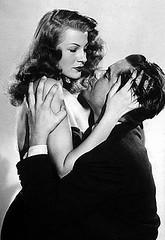Johnny is a con man new to Argentina when his luck changes and he talks his way into a job for Ballin, a crime boss who runs an illegal casino. Over the years Johnny rises to prominence and helps Ballin both alike in their philosophy that gambling comes first and women don’t mix with it. When Johnny is left in charge of the casino he thinks he’s finally made his way into the top run he should be, unitl Ballin returns home later with something Johnny never predicted - a new wife, Gilda. Not only does this throw Johnny into a strange terriroty with his relationship with Ballin, but Gilda & Johnny must hide from the ever jealous Ballin that they once knew each other and were in love.
Gilda is one of the most biting love triangles I may have ever seen on film, mostly because the emotions involved don’t seem to be love. Gilda & Johnny hate each other because of their past love, and betrayals; Ballin treats gilda as an object to be desired and lord jealously over others; Gilda seeks to push herself into the arms of any man that shows her attention; and on top of all this Johnny & Ballin jealously continue to test their relationship by using Gilda as their leverage. It’s a heck of a thing.
This is one of the characters that defines the way we look at Rita Hayworth and now that I’ve seen the film I can see why. Gilda is a bundle of contradictions – she is one of the single best film noir women that I’ve seen, and I’ve seen a lot of noir. Hayworth is stunning, provocative, feminine and weak or strong when she needs to be, the perfect vixen with a soul.
The only downside I see in Gilda is perhaps how neatly it ends. For a story that has so much, greed, jealously, and double-crossing the resolution seems to come about in a manner too simple for how complex the rest of the story has been. Due to the era in which Gilda was released I don’t know how much of that was the filmmaking team making decisions versus the censorship of the day taking over and mandating what kind of stories and events the audiences could handle. I would be quite interested to see if perhaps there had been another, or at least more extended ending written for this film.
Director: Charles Vidor
Obregon: You two kids love each other pretty terribly, don't you?
Johnny Farrell: I hate her!
Obregon: That's what I mean. It's the most curious love-hate pattern I've ever had the privilege of witnessing.

No comments:
Post a Comment